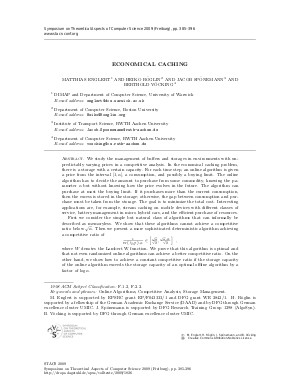Economical Caching
Authors Matthias Englert, Heiko Röglin, Jacob Spönemann, Berthold Vöcking
-
Part of:
Volume:
26th International Symposium on Theoretical Aspects of Computer Science (STACS 2009)
Part of: Series: Leibniz International Proceedings in Informatics (LIPIcs)
Part of: Conference: Symposium on Theoretical Aspects of Computer Science (STACS) - License:
 Creative Commons Attribution-NoDerivs 3.0 Unported license
Creative Commons Attribution-NoDerivs 3.0 Unported license
- Publication Date: 2009-02-19
File

PDF
LIPIcs.STACS.2009.1826.pdf
- Filesize: 176 kB
- 12 pages
Document Identifiers
Subject Classification
Keywords
- Online algorithms
- Competitive analysis
- Storage management
Metrics
- Access Statistics
-
Total Accesses (updated on a weekly basis)
0Document
0Metadata
Abstract
We study the management of buffers and storages in environments with unpredictably varying prices in a competitive analysis. In the economical caching problem, there is a storage with a certain capacity. For each time step, an online algorithm is given a price from the interval $[1,\alpha]$, a consumption, and possibly a buying limit. The online algorithm has to decide the amount to purchase from some commodity, knowing the parameter $\alpha$ but without knowing how the price evolves in the future. The algorithm can purchase at most the buying limit. If it purchases more than the current consumption, then the excess is stored in the storage; otherwise, the gap between consumption and purchase must be taken from the storage. The goal is to minimize the total cost. Interesting applications are, for example, stream caching on mobile devices with different classes of service, battery management in micro hybrid cars, and the efficient purchase of resources.
First we consider the simple but natural class of algorithms that can informally be described as memoryless. We show that these algorithms cannot achieve a competitive ratio below $\sqrt{\alpha}$. Then we present a more sophisticated deterministic algorithm achieving a competitive ratio of
\[\textstyle
\frac{1}{W\left(\frac{1-\alpha}{e\alpha}\right)+1} \in
\left[\frac{\sqrt{\alpha}}{\sqrt{2}},
\frac{\sqrt{\alpha}+1}{\sqrt{2}}
\right] \enspace, \]
where $W$ denotes the Lambert~W function. We prove that this algorithm is optimal and that not even randomized online algorithms can achieve a better competitive ratio. On the other hand, we show how to achieve a constant competitive ratio if the storage capacity of the online algorithm exceeds the storage capacity of an optimal offline algorithm by a factor of $\log \alpha$.
Cite As Get BibTex
Matthias Englert, Heiko Röglin, Jacob Spönemann, and Berthold Vöcking. Economical Caching. In 26th International Symposium on Theoretical Aspects of Computer Science. Leibniz International Proceedings in Informatics (LIPIcs), Volume 3, pp. 385-396, Schloss Dagstuhl – Leibniz-Zentrum für Informatik (2009)
https://doi.org/10.4230/LIPIcs.STACS.2009.1826
BibTex
@InProceedings{englert_et_al:LIPIcs.STACS.2009.1826,
author = {Englert, Matthias and R\"{o}glin, Heiko and Sp\"{o}nemann, Jacob and V\"{o}cking, Berthold},
title = {{Economical Caching}},
booktitle = {26th International Symposium on Theoretical Aspects of Computer Science},
pages = {385--396},
series = {Leibniz International Proceedings in Informatics (LIPIcs)},
ISBN = {978-3-939897-09-5},
ISSN = {1868-8969},
year = {2009},
volume = {3},
editor = {Albers, Susanne and Marion, Jean-Yves},
publisher = {Schloss Dagstuhl -- Leibniz-Zentrum f{\"u}r Informatik},
address = {Dagstuhl, Germany},
URL = {https://drops.dagstuhl.de/entities/document/10.4230/LIPIcs.STACS.2009.1826},
URN = {urn:nbn:de:0030-drops-18263},
doi = {10.4230/LIPIcs.STACS.2009.1826},
annote = {Keywords: Online algorithms, Competitive analysis, Storage management}
}
